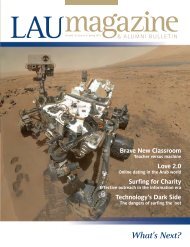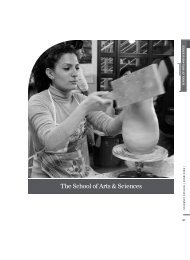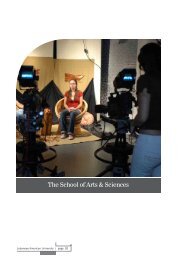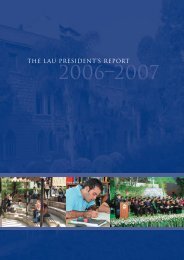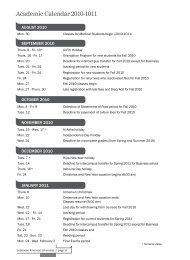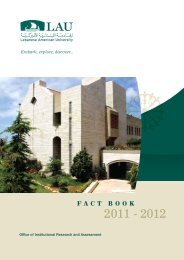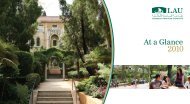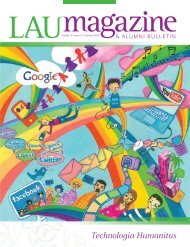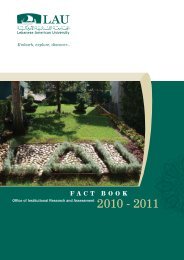2008â2009 (PDF, 6 MB) - LAU Publications - Lebanese American ...
2008â2009 (PDF, 6 MB) - LAU Publications - Lebanese American ...
2008â2009 (PDF, 6 MB) - LAU Publications - Lebanese American ...
- No tags were found...
You also want an ePaper? Increase the reach of your titles
YUMPU automatically turns print PDFs into web optimized ePapers that Google loves.
PROGRAMSPROGRAMSlearning OutcomesGraduates of the Mathematics EducationProgram have the necessary skills, and attitudes,that enable them to meet the challenges of theirprofession with creativity, self-reliance, critical thinking,and responsibility.Graduates of the program will:1. Have a mathematical strength that is groundedin the ability to reason mathematically, bothformally and informally, to solve challengingproblems by building, and/or using, appropriatemathematical structures.2. Have the skills to communicate effectively, andpersuasively, their mathematical thinking, inboth written and oral forms.3. Have an appreciation for mathematical rigor,and mathematical inquiry.4. Be able to encourage, and guide, the developmentof mathematical communication, intheir own (future) classrooms.5. Recognize, through their own experiences oflearning mathematics, how they, and others,have built and utilized the rich connectionsamong mathematical ideas: they will emphasizein their own classrooms, with their ownstudents, the importance of building useful,connected understanding.6. Use various ways of representing mathematicalideas, including verbal, graphical, numerical,and symbolic, to support and deepenmathematical understandings.7. Adopt technology as an essential tool forthoughtfully teaching, learning, doing, andunderstanding, important mathematics.8. Construct mathematical models to solve practical,and real life, problems.9. Develop the ability to think logically, and critically,and to analyze information in a mathematicalsetting. Develop the ability to teachstudents how to reformulate, and solve, problemsin an abstract framework.10. Design positive, and effective learning environmentsin their classrooms.The Mathematics Education Program requires atotal number of 51 credits: 24 in Mathematics and21 credits in Education. The remaining six creditsare to be taken from Computer Science. Furthermore,students can opt to do a Teaching Diploma,which consists of 18 credits, to be taken over andabove the Bachelor’s Degree requirements.Mathematics (24 credits)MTH201 Calculus III 3MTH207 Discrete Structures I 3MTH301 Linear Algebra 3MTH302 Geometry 3MTH303 Numerical Methods 3MTH305 Probability and Statistics 3MTH311 Abstract Algebra 3MTH499 Mathematics Senior Study 3Education (21 credits)EDU201 Fundamentals of Education 3EDU202 Observation and Curriculum 3EDU310 Computers in Education 3EDU315 The Teaching of Mathematics in 3Intermediate and Secondary SchoolsEDU332 Educational Measurement 3EDU425 Practice Teaching–Secondary 6Math EducationComputer Science (6 credits)CSC241 Introduction to Computing 3CSC243 Introduction to Object 3Oriented ProgrammingMASTER Of ARTS DEgREEPROgRAMS4M.A. iN COMPARATiVE liTERATUREMissionThe Mission of the Graduate Program in ComparativeLiterature is to teach, train, and conduct research inliterature and transcultural studies, in addition totranslation, with special attention to Lebanon andthe Middle East in general. The Program offerscoursework in English, Arabic, Persian, and French,in response to the students’ needs and capacities.The aim is to explore the role of culture in a multiethnicglobalizing world.Educational ObjectivesThe purpose of the Graduate Program inComparative Literature is to:1. Offer students linguistic and cultural trainingin more than one cultural zone.2. Offer students a highly individualized curriculum,through close cooperation with otherdisciplines in the humanities, arts, and socialsciences.3. Allow students to acquire an exceptionaldegree of expertise in regional interculturalrelations, and a broadened perspective on thevariety, and complexity, of the Middle Easterncultures, combined with advanced training incritical, and poststructuralist, theories.4. Explore a range of literary, and cultural, theories,and demonstrate significant mastery ofone or two.5. Achieve broad intercultural competence ingenre, period, and theme.6. Receive advanced training in written, and oral,communication through working with experiencedresearchers.learning OutcomesGraduate students in Comparative Literature willbe able to:1. Develop a high level of complexity and specializationin methodology, theory, periods,themes, and literary genres, that constitute theframework within which students can pursuetheir study and research.2. Develop the skills to teach, train, and to conductresearch in literature, and transculturalstudies, with special attention to Lebanon andthe Middle East in general.3. Acquire an exceptional degree of expertise inregional intercultural relations.4. Obtain advanced standing in secondary schoolteaching, work as a literary translator, or workas a specialist in literature and culture, for thepress, for international publishers, in diplomacy,and in international organizations.5. Acquire the knowledge, and the skills, whichqualify them to pursue their education in thefield at a Ph.D. level.Comparative literature is the critical study oftexts in two or more languages. Practitioners mostoften describe their work as the interdisciplinarystudy of literature, and other cultural productions,across national, ethnic, and linguistic boundaries.Periods, genres, themes, movements, and crossculturalinfluences are among the objects of study.Comparatists draw their methods from the literarytradition, as well as from other fields of the humanitiesand the sciences.The Mission of the Program in ComparativeLiterature at <strong>LAU</strong> is to provide instruction, and toconduct research, in literature, cultural criticism,and translation, with special attention to Lebanonand the Middle East. The aim is to explore the roleof culture in a multiethnic globalizing world.Advanced training is offered in three areas ofstudy:> Literature and other cultural productions.Students will achieve broad intercultural competencein genre, period, and theme.> Theoretical frameworks. Students will explore arange of literary, and cultural theories, and demonstratesignificant mastery of one or two.> Research methods and written and oral expression.Students will work with experienced researchersin a variety of media, and receive advancedtraining in written and oral communication.ACADEMIC CATALOG [ 2008-2009 ] SCHOOl Of ARTS & SCiENCESA&S91<strong>Lebanese</strong> <strong>American</strong> University | page 90



